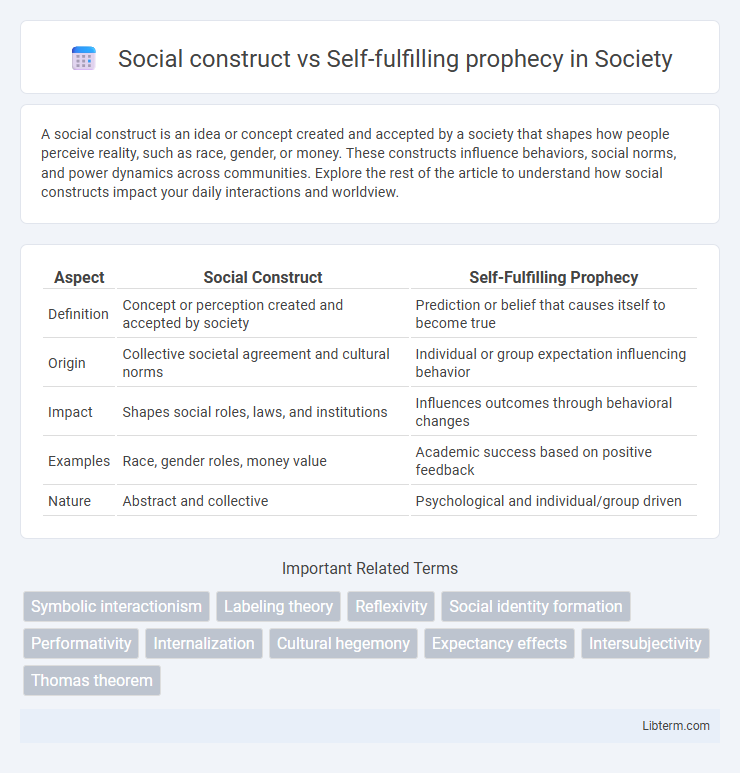A social construct is an idea or concept created and accepted by a society that shapes how people perceive reality, such as race, gender, or money. These constructs influence behaviors, social norms, and power dynamics across communities. Explore the rest of the article to understand how social constructs impact your daily interactions and worldview.
Table of Comparison
| Aspect | Social Construct | Self-Fulfilling Prophecy |
|---|---|---|
| Definition | Concept or perception created and accepted by society | Prediction or belief that causes itself to become true |
| Origin | Collective societal agreement and cultural norms | Individual or group expectation influencing behavior |
| Impact | Shapes social roles, laws, and institutions | Influences outcomes through behavioral changes |
| Examples | Race, gender roles, money value | Academic success based on positive feedback |
| Nature | Abstract and collective | Psychological and individual/group driven |
Defining Social Constructs: Foundations and Implications
Social constructs are collectively agreed-upon ideas or norms that shape societal behaviors and perceptions, such as gender roles or race classifications, influencing social interactions and identity formation. These constructs function as frameworks that guide expectations and define reality within a community, making them critical to understanding social order and cultural dynamics. Recognizing social constructs highlights how societal knowledge is constructed and maintained, impacting policies, institutions, and individual experiences.
What is a Self-Fulfilling Prophecy? Understanding the Concept
A self-fulfilling prophecy occurs when an individual's belief or expectation influences their behavior, causing the anticipated outcome to materialize. This psychological phenomenon demonstrates how perceptions can shape reality, reinforcing the initial assumption through actions and reactions. Understanding self-fulfilling prophecies sheds light on the powerful impact of mindset and social expectations on personal and collective experiences.
Origins and Evolution of Social Constructs
Social constructs originate from shared human agreements and cultural norms that shape perceptions of reality over time, evolving through collective experiences and societal reinforcement. These constructs influence behaviors and expectations, often perpetuating themselves as self-fulfilling prophecies when individuals act according to the assigned social roles or labels. Historical examples include race, gender roles, and class distinctions, which have been continuously redefined through social, political, and economic changes.
Psychological Mechanisms Behind Self-Fulfilling Prophecies
Self-fulfilling prophecies operate through psychological mechanisms such as expectation formation, selective attention, and behavioral confirmation, where individuals unconsciously alter their actions to align with anticipated outcomes. These processes are influenced by social constructs--shared beliefs and norms--that shape expectations and guide social interactions, reinforcing the prophecy's validity. Cognitive biases like confirmation bias further entrench these expectations by filtering information to support preexisting beliefs, perpetuating a cycle of predictive accuracy and behavioral alignment.
Real-Life Examples of Social Constructs in Society
Gender roles exemplify social constructs, shaping expectations and behaviors based on societal norms rather than biological differences. Racial categories influence social interactions and access to resources, despite lacking a genetic basis, demonstrating the power of collective beliefs in defining identity. Social class stratification affects opportunities and social mobility, perpetuated by shared perceptions about status and economic worth.
How Self-Fulfilling Prophecies Shape Personal Outcomes
Self-fulfilling prophecies shape personal outcomes by reinforcing expectations that influence behavior and decision-making, leading individuals to act in ways that confirm those initial beliefs. Psychological studies show that when people internalize societal labels or stereotypes, their actions align with the anticipated roles, creating a cycle that sustains those outcomes. This dynamic illustrates how perceptions embedded in social constructs become realities through repeated behavioral patterns and feedback loops.
Intersections: When Social Constructs Fuel Self-Fulfilling Prophecies
Social constructs create shared beliefs and expectations that shape individual behavior, often establishing norms that individuals internalize and act upon. When these socially constructed norms generate expectations about certain groups or outcomes, they can trigger self-fulfilling prophecies, where individuals conform to the roles assigned to them, reinforcing the original belief. This intersection perpetuates cycles of behavior and societal patterns, making it difficult to disentangle reality from the social narrative.
Societal Impact: Changing Narratives and Breaking Cycles
Social constructs shape societal norms by defining roles and behaviors that individuals internalize, which can perpetuate stereotypes and inequalities. Self-fulfilling prophecies reinforce these narratives as individuals act according to expectations imposed by society, often limiting personal and collective growth. Changing these entrenched narratives involves critical reflection and cultural shifts to break cycles of discrimination and enable more inclusive, empowering social frameworks.
Critiques and Debates: Limitations of Both Concepts
Both social construct theory and self-fulfilling prophecy face critiques regarding their explanatory power and empirical limitations. Social construct theory is criticized for sometimes downplaying biological or material realities, while self-fulfilling prophecy is challenged for its potential circular reasoning and difficulty in isolating causality in complex social behaviors. Debates focus on how these concepts intersect yet fall short in fully accounting for individual agency versus structural influences in behavioral outcomes.
Reimagining Identity: Challenging Constructs and Prophecies for Change
Social constructs shape identity by imposing external definitions that individuals often internalize, while self-fulfilling prophecies perpetuate these identities by influencing behaviors aligned with societal expectations. Reimagining identity involves critically challenging these imposed narratives and actively creating new frameworks that empower personal transformation and resist limiting labels. This process fosters resilience and innovation, enabling individuals and communities to transcend deterministic social roles and cultivate authentic self-expression.
Social construct Infographic

 libterm.com
libterm.com